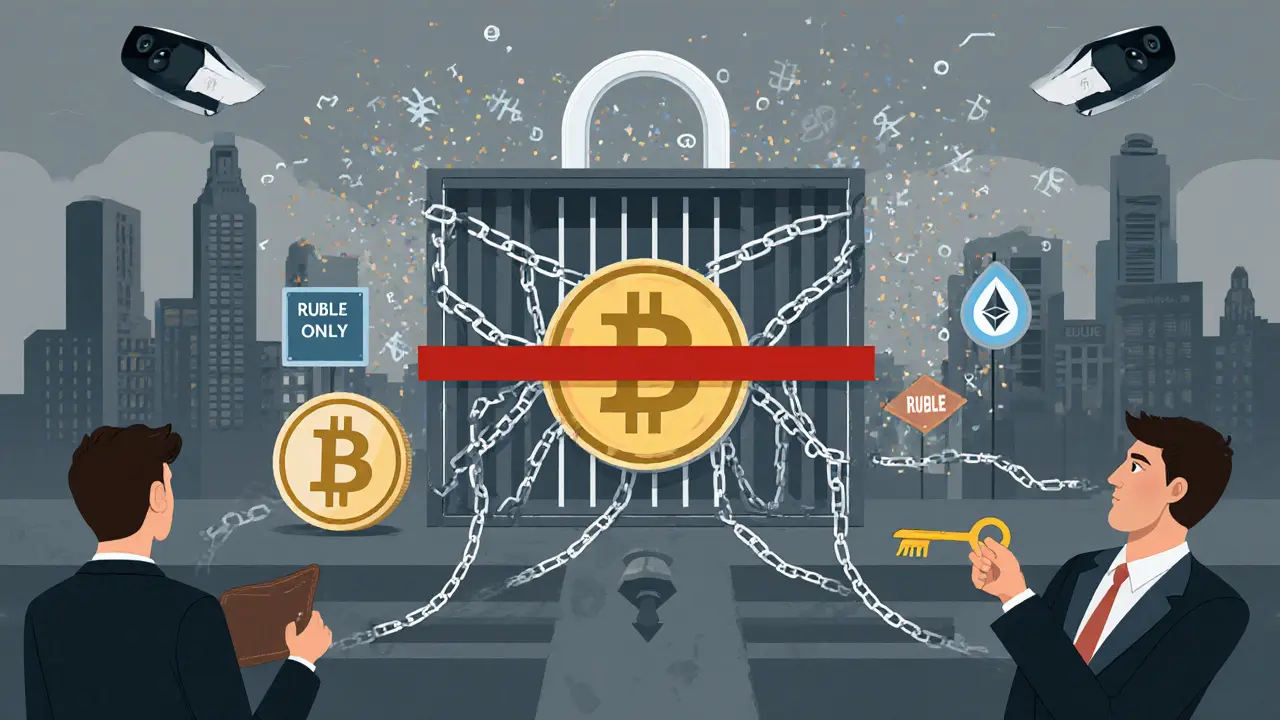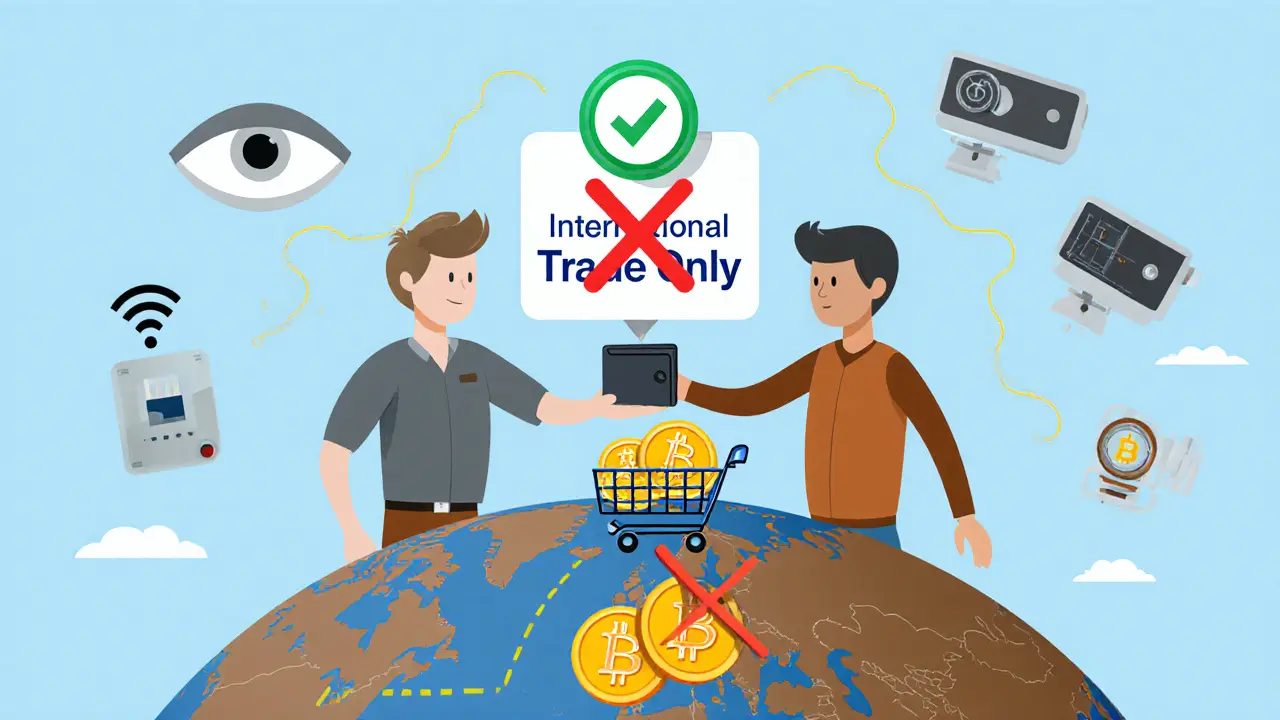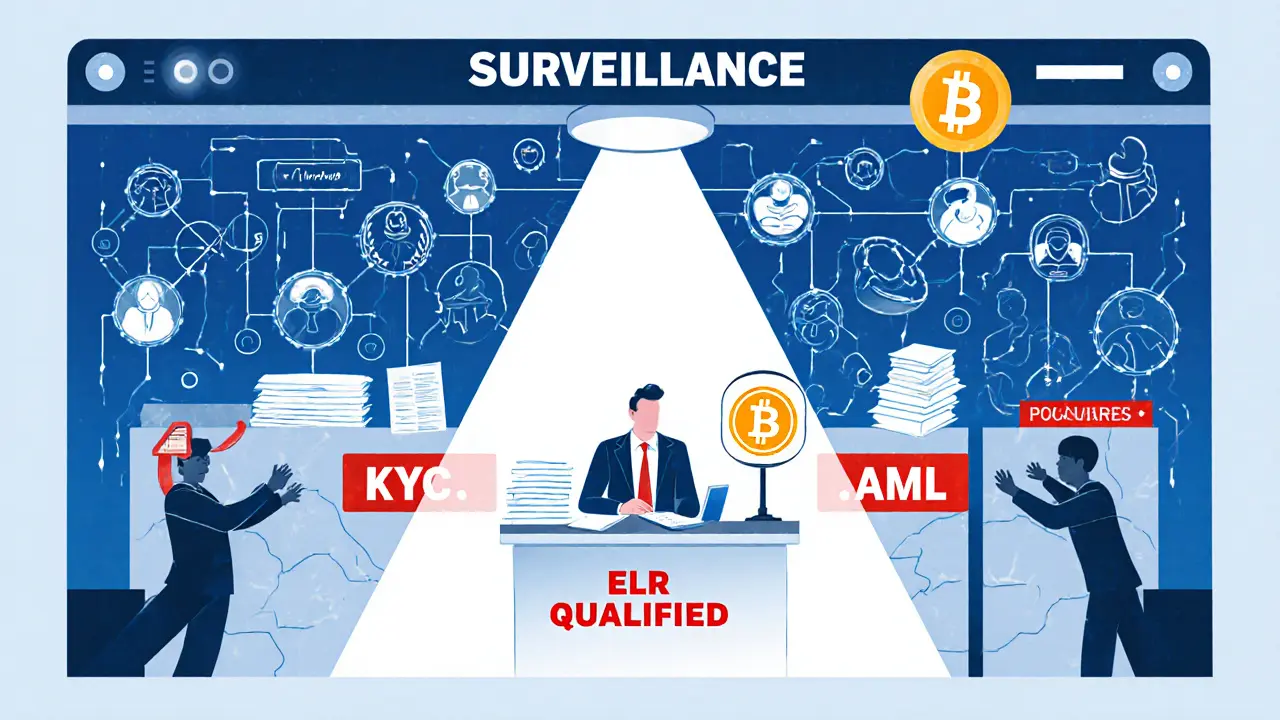
Russian Crypto Compliance Checker
Check Your Crypto Activity
Determine if your crypto transaction complies with Russia's 2025 regulations based on your activity type and transaction amount.
Compliance Results
Enter details above to check compliance status
By October 2025, Russia has one of the strictest cryptocurrency frameworks in the world-not because it wants to ban crypto entirely, but because it wants to control every single move. The Central Bank of Russia (CBR) doesn’t see Bitcoin or Ethereum as the future of money. It sees them as unpredictable, risky, and potentially destabilizing. So instead of letting people trade freely, it built a cage: small, tightly monitored, and only open for specific uses.
Domestic Crypto Payments Are Still Illegal
If you’re a Russian citizen trying to pay for groceries with Bitcoin, you’re breaking the law. The CBR has made this crystal clear: crypto cannot be used for payments within Russia. This isn’t a suggestion. It’s a ban. And it’s been in place since 2021, with no signs of weakening. The bank’s reasoning? Protecting the ruble. If people start using crypto for everyday transactions, it could undermine monetary control, fuel inflation, and weaken the state’s ability to manage the economy.
This ban isn’t just about banks refusing to process crypto. It’s about the entire financial system being locked down. Any Russian financial institution-banks, payment processors, even fintech apps-is forbidden from facilitating crypto transactions between residents. Violations carry legal liability. The CBR doesn’t just want to discourage crypto use; it wants to make it impossible for ordinary people to use it domestically.
The One Exception: International Trade
But here’s the twist. In summer 2024, Russia quietly opened a backdoor. Thanks to Western sanctions cutting off traditional banking channels, the government allowed companies to use digital assets for international trade. This wasn’t a policy shift toward crypto-it was a survival tactic.
Now, Russian exporters can receive payments in Bitcoin, stablecoins, or other digital currencies from overseas buyers. Importers can pay foreign suppliers the same way. The CBR doesn’t care what currency is used abroad, as long as it doesn’t touch the domestic economy. This loophole lets businesses keep trading when SWIFT and dollar-based systems are blocked. Experts call it a "critical workaround," not a crypto endorsement.
But even this exception is tightly controlled. Companies must report these transactions to tax authorities. The CBR monitors them through its digital surveillance platform, which tracks wallet addresses and links them to real identities. There’s no freedom here-just a narrow, regulated path.
The Experimental Legal Regime: Crypto Under Lock and Key
The CBR’s most ambitious move is the Experimental Legal Regime (ELR). Think of it as a government-approved crypto sandbox-but with iron bars. Only "especially qualified" investors can enter. To qualify, you need to prove you have significant wealth, financial literacy, and no history of suspicious activity. The bar is high: think million-dollar portfolios and professional investment experience.
Once inside, you can trade crypto, hold tokens, even use them for certain financial instruments. But everything is tracked. Every transaction, every wallet, every transfer must be reported. The CBR has built a digital platform with the Ministry of Digital Development to de-anonymize users. Even if you use a privacy-focused coin, the system can trace it back to you.
And here’s the catch: if you’re not in the ELR, you can’t touch crypto at all. The CBR has proposed making it illegal for Russian residents to conduct any crypto transactions outside this regime. That means peer-to-peer trades, crypto ATMs, or using foreign exchanges-all of it could become punishable offenses.

Banking Rules: Crypto Is a Risk You Can’t Afford
Russian banks are under even tighter control. In May 2025, the CBR issued an informational letter (IN 03-23/87) that changed everything. It didn’t ban banks from dealing with crypto-but it made it so expensive and risky that no one would want to.
Under the new rules, any bank that touches crypto must back every ruble of customer investment with its own rubles. If a client invests 1 million rubles in Bitcoin, the bank must hold 1 million rubles in reserves just for that one client. That’s called "full asset coverage." It’s like forcing a bank to keep a vault full of cash just to let someone buy crypto. No leverage. No risk-sharing. No profit potential.
And starting in 2026, banks will face a hard cap: they can’t have more than 1% of their total capital tied to crypto-related activities. For a large bank with 1 trillion rubles in capital, that’s just 10 billion rubles-barely enough to cover a few high-net-worth clients. This rule, called "CryptoBasel" by legal experts, is modeled after global banking standards, but applied with extreme caution.
Andrey Tugarin of GMT Legal says this isn’t new policy-it’s just paperwork. Banks have been avoiding crypto for years. Now, the CBR is just making their reluctance official.
Stablecoins Are Coming-But Not How You Think
By the end of 2025, Russia will finalize its first official rules for stablecoins. The Ministry of Finance wants them to be "beneficial for businesses and citizens." Sounds promising, right? But the CBR’s version looks nothing like the U.S. or EU models.
Russian stablecoins won’t be for payments. They won’t be for savings. They’ll be for international trade settlements-just like Bitcoin. And they’ll be tightly controlled. Only approved issuers can create them. Every coin must be fully backed by rubles or approved foreign assets. And every transaction must pass through state-monitored systems.
Deputy Finance Minister Ivan Chebeskov says this will improve Russia’s global standing. But the CBR’s real goal is clearer: prevent unregulated stablecoins from becoming a parallel currency. If you can’t use crypto to pay for coffee, you sure as hell can’t use a stablecoin either.

Surveillance Is Built Into the System
Russia’s crypto framework isn’t just about rules-it’s about control. The CBR, working with Rosfinmonitoring and the Ministry of Digital Development, has built a nationwide surveillance system for digital assets. It tracks:
- Wallet addresses linked to real identities
- Transactions over 600,000 rubles (about $6,500 USD)
- Peer-to-peer trades between individuals
- Miners, exchanges, and even crypto brokers
Any service provider-whether it’s a legal exchange or a shady Telegram bot-must integrate into this system or get blocked. No exceptions. The government doesn’t want to eliminate crypto. It wants to own it.
AML and KYC aren’t optional. They’re mandatory. Every investor in the ELR must submit documents. Every transaction is logged. Even if you’re just holding crypto in a wallet, if you ever move it, the state knows.
What’s Next? Total Control
The CBR’s long-term plan isn’t to coexist with crypto. It’s to absorb it. By 2026, the goal is to consolidate all crypto infrastructure under state control. That means private exchanges may be forced to become government-operated platforms. Miners might need licenses to operate. Wallet providers could be required to hand over private keys to regulators.
There’s no talk of Bitcoin as digital gold. No talk of financial freedom. Just a system where every digital asset is traceable, reportable, and subject to state approval.
And the message to ordinary Russians? Don’t bother. The rules aren’t designed to help you. They’re designed to protect the state from what it sees as a threat. Crypto isn’t banned because it’s dangerous-it’s banned because it’s uncontrollable. And in Russia, control is everything.
Can Russians legally buy or hold cryptocurrency?
Yes, but only under strict conditions. Russians can hold cryptocurrency if they’re part of the Experimental Legal Regime (ELR), which requires high financial qualifications and full compliance with KYC/AML rules. Outside the ELR, holding crypto isn’t illegal, but any transaction-buying, selling, or transferring-outside state-approved channels could lead to penalties.
Is crypto trading allowed in Russia?
Only for qualified investors inside the Experimental Legal Regime. All trading must go through state-approved platforms that report every transaction to the Central Bank. Peer-to-peer trading, foreign exchanges, and decentralized platforms are effectively banned for domestic users.
Can Russian banks invest in cryptocurrency?
No, not in any meaningful way. Banks are prohibited from investing client funds in crypto. Even their own capital exposure is capped at 1% of total assets starting in 2026. Every crypto-related transaction must be fully backed by the bank’s own rubles, making it financially unattractive and legally risky.
Why does Russia allow crypto for international trade?
Because Western sanctions made traditional banking nearly impossible for Russian businesses. Crypto provides a way to receive payments from overseas buyers and pay foreign suppliers without using SWIFT or dollar-based systems. It’s a practical workaround-not a policy shift. The CBR still bans domestic crypto use to protect the ruble.
Are stablecoins legal in Russia?
Not yet officially, but regulations are expected by the end of 2025. Approved stablecoins will be allowed only for international trade settlements and must be fully backed by rubles or approved foreign assets. They won’t be usable for payments, savings, or everyday transactions within Russia.
What happens if someone breaks Russia’s crypto rules?
Violations can lead to fines, asset freezes, or criminal liability. The state actively monitors transactions over 600,000 rubles and can trace wallet addresses to real identities. Using unauthorized platforms or conducting P2P trades outside the ELR may be treated as financial crime under Russian law.
madhu belavadi
29 10 25 / 03:37 AMThis is wild. Russia doesn't want crypto because it can't control it. That's not regulation, that's fear dressed up as policy.
Meanwhile, my cousin in Delhi buys Bitcoin on Telegram like it's street food.
Dick Lane
30 10 25 / 03:41 AMThey're not banning crypto they're just making it so painful to use that only the desperate or the elite can bother
Kinda brilliant in a twisted way. Sanctions forced their hand and now they've turned a weakness into a control mechanism
Still feels like locking the barn after the horses are already in Mexico
Norman Woo
31 10 25 / 23:18 PMyou think this is about control
nah
this is the deep state prepping for the digital dollar takeover
they're building the surveillance backbone right now
every wallet address they track is a step toward your bank account being frozen by AI
they're not afraid of bitcoin
they're afraid of what happens when people realize they don't need the state to be their banker
watch the ELR get expanded to include biometric wallet access next year
they already have your face in their database
Serena Dean
1 11 25 / 18:28 PMOkay but let’s be real - this is actually the most honest crypto policy I’ve seen in years.
They’re not pretending it’s about innovation or financial freedom.
They’re saying: ‘We’re the government, we protect the system, and if you want to play in crypto, you play by our rules.’
It’s not sexy, but at least it’s transparent.
And honestly? The stablecoin-for-trade-only move makes total sense. It’s like using duct tape to fix a leak while you build a new pipe.
James Young
1 11 25 / 22:36 PMStop pretending this is nuanced. Russia isn’t regulating crypto - they’re weaponizing bureaucracy to crush it.
You call that ‘controlled sandbox’? That’s a prison with a fancy name.
Full asset coverage? That’s not a rule, that’s a suicide pact for banks.
And don’t give me that ‘only for trade’ nonsense - if you can’t use it domestically, it’s dead weight.
This isn’t policy, it’s panic dressed in legal jargon.
Meanwhile, China’s building a digital yuan that actually works. Russia? They’re just scared.
Chloe Jobson
3 11 25 / 05:33 AMELR is essentially a KYC/AML superstructure with a crypto veneer
State-monitored wallets + mandatory reporting + capital constraints = de facto prohibition
Stablecoins for B2B settlement only? That’s not adoption - that’s containment
They’ve created a regulatory moat around the entire ecosystem
It’s not about innovation. It’s about isolation.
Andrew Morgan
4 11 25 / 16:54 PMMan I just read this whole thing and I’m not even mad
It’s like they took every crypto dream and turned it into a spreadsheet with 17 mandatory fields
‘You want to hold BTC? Cool. Here’s your 12-page form. Here’s your biometric scan. Here’s your 1 million ruble minimum. Here’s your government tracker.
Oh and if you move it? We know.
Good luck with that.
Meanwhile, my dog has more privacy than a Russian crypto holder
Michael Folorunsho
5 11 25 / 21:10 PMOf course Russia is doing this. The West has spent 20 years preaching ‘financial freedom’ while looting the global economy with the dollar. Now they’re surprised when a sovereign nation builds its own firewall?
Let them have their crypto sandbox. The real winners are the ones who never trusted the system to begin with.
This isn’t authoritarianism - it’s economic sovereignty.
And if you think Bitcoin is about freedom, you’ve never lived under a currency that can be erased with a tweet.
Roxanne Maxwell
6 11 25 / 11:55 AMI get why they’re doing this. It’s scary to lose control of your money system.
But I also feel bad for regular Russians who just want to save or send money to family abroad.
They’re stuck in the middle of a geopolitical war they didn’t start.
Maybe one day they’ll find a way to make this less punishing.
Until then, I hope they’re okay.
Jonathan Tanguay
7 11 25 / 20:51 PMSo let me get this straight - the CBR says crypto is dangerous but lets businesses use it for international trade? That’s not a loophole, that’s a contradiction wrapped in a bureaucratic burrito.
And the ‘Experimental Legal Regime’? That’s not an experiment, that’s a trapdoor for the wealthy. Only millionaires get to play? What’s next, a crypto VIP lounge with a butler who submits your transaction reports?
And full asset coverage? That’s not banking, that’s financial masochism. No bank in their right mind would touch this unless they’re being paid in gold bars and silence.
Also, the fact that they’re tracking P2P trades means they’re basically spying on your Telegram group chats now.
And don’t even get me started on the ‘CryptoBasel’ thing - it’s just Basel III with extra steps and more paranoia.
Bottom line: Russia didn’t create a crypto policy, they created a surveillance manual with a side of crypto.
Ayanda Ndoni
9 11 25 / 07:01 AMWhy are we even talking about this? Russia’s just being Russia.
They’ll ban it, then let it through the backdoor, then spy on it, then charge you for it.
Meanwhile I’m just trying to buy a new phone.
Can we move on?
Elliott Algarin
10 11 25 / 06:25 AMIt’s funny how control and fear are always the first tools used when a system feels threatened.
Bitcoin was supposed to be a challenge to centralized power.
But now, the most powerful states aren’t fighting it - they’re absorbing it.
They’re turning decentralization into a controlled variable.
Maybe the real revolution isn’t in the blockchain.
Maybe it’s in realizing that even the most radical ideas get folded into the machine.
And we’re just watching.
John Murphy
10 11 25 / 11:41 AMSo if I hold crypto in a wallet but never move it, am I still under surveillance?
What if I bought it before the ELR and never touched it again?
Is just owning it a violation?
They say transactions are tracked but what about passive holding?
Does the state know I have it even if I never sell?
Just wondering how deep this goes
Zach Crandall
10 11 25 / 15:11 PMWhile the Russian Central Bank's approach may appear draconian, it is, in fact, a highly calibrated response to the systemic vulnerabilities exposed by Western financial sanctions.
The Experimental Legal Regime constitutes a state-sanctioned mechanism for the formalization of digital asset flows within a sovereign monetary framework.
By mandating full asset coverage and imposing stringent capital constraints, the CBR effectively neutralizes systemic risk while preserving the utility of digital assets for critical international trade.
This is not repression - it is institutional resilience.
One must consider that in an era of financial weaponization, sovereignty necessitates control.
Decentralization, in this context, is not an end but a vector to be channeled.
The future of monetary policy lies not in the abolition of crypto, but in its subordination to national economic imperatives.
It is, quite simply, the only rational path forward.